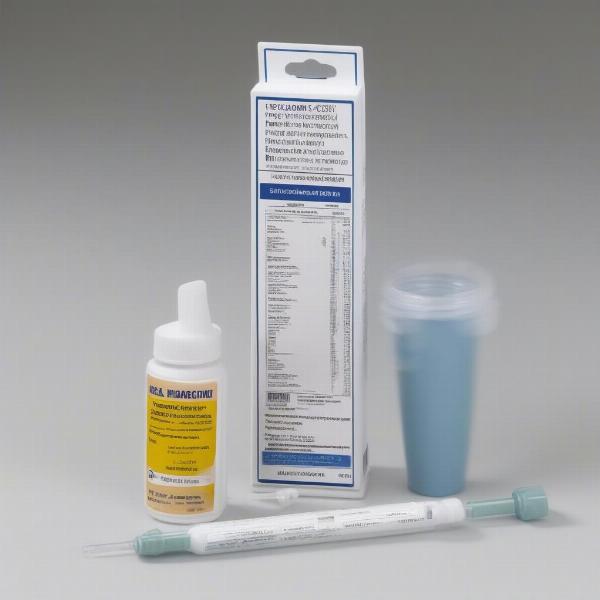Inflacam, known generically as meloxicam, is a non-steroidal anti-inflammatory drug (NSAID) often prescribed for dogs to manage pain and inflammation. This guide explores the uses, benefits, potential risks, and essential considerations for using Inflacam in dogs.
Inflacam is commonly used to alleviate pain and inflammation associated with osteoarthritis, surgery, and other conditions causing discomfort in dogs. It works by inhibiting the production of prostaglandins, which are substances that contribute to pain and inflammation. While Inflacam can significantly improve a dog’s quality of life by reducing pain and promoting mobility, it’s crucial to understand its proper usage and potential side effects.
Understanding Inflacam Usage in Dogs
Inflacam is typically administered orally, either as a liquid suspension or chewable tablet. The dosage depends on the dog’s weight and the specific condition being treated. It’s vital to follow your veterinarian’s prescribed dosage and administration instructions carefully. Never administer human-formulated meloxicam to dogs, as it can be toxic and potentially fatal.
 Inflacam Oral Suspension for Dogs
Inflacam Oral Suspension for Dogs
Administering the correct dosage is paramount for ensuring your dog’s safety and the effectiveness of the treatment. Overdosing can lead to serious side effects, including gastrointestinal issues, kidney damage, and even liver failure.
Potential Side Effects of Inflacam in Dogs
While generally safe when used as directed, Inflacam can cause side effects in some dogs. The most common side effects include vomiting, diarrhea, loss of appetite, and lethargy. More serious, though less frequent, side effects include changes in drinking and urination, jaundice, and black, tarry stools.
If your dog exhibits any of these signs while taking Inflacam, contact your veterinarian immediately. Early detection and intervention are crucial for managing potential complications.
When to Avoid Inflacam in Dogs
Certain dogs should not be given Inflacam. This includes dogs with pre-existing kidney or liver disease, bleeding disorders, or a known hypersensitivity to NSAIDs. Puppies under six weeks of age and pregnant or lactating dogs should also avoid Inflacam.
Long-Term Use of Inflacam in Dogs
For chronic conditions like osteoarthritis, Inflacam may be prescribed for long-term use. Regular monitoring by a veterinarian is essential in these cases. Blood tests may be recommended periodically to assess kidney and liver function and ensure the medication’s safety and efficacy over time.
Inflacam and Other Medications
Inform your veterinarian about all other medications your dog is taking, including supplements and over-the-counter drugs. Some medications can interact negatively with Inflacam, leading to adverse reactions.
What to Expect While Your Dog is on Inflacam
While on Inflacam, your dog should experience a reduction in pain and inflammation, leading to improved mobility and comfort. Monitor your dog closely for any changes in behavior, appetite, or bowel movements. Contact your veterinarian promptly if you observe anything unusual.
Conclusion
Inflacam can be an effective tool for managing pain and inflammation in dogs, significantly improving their quality of life. However, responsible usage, careful monitoring, and open communication with your veterinarian are paramount for ensuring its safe and effective application. Never hesitate to contact your veterinarian with any concerns about your dog’s health while on Inflacam.
FAQ
-
How long does it take for Inflacam to work in dogs? Inflacam typically begins working within a few hours of administration.
-
Can I give my dog Inflacam with food? Yes, Inflacam can be given with or without food.
-
What should I do if I miss a dose of Inflacam? Give the missed dose as soon as you remember, unless it’s close to the time for the next dose. Do not double up on doses.
-
Can Inflacam be used long-term in dogs? Yes, but under close veterinary supervision with regular monitoring.
-
Are there any natural alternatives to Inflacam for dogs? Discuss potential natural pain management options with your veterinarian.
-
Can I buy Inflacam over the counter? No, Inflacam requires a prescription from a veterinarian.
-
What should I tell my vet before my dog starts Inflacam? Inform your vet about your dog’s medical history, any other medications they are taking, and any known allergies.
ILM Dog is your trusted resource for comprehensive dog care information. We offer expert guidance on dog breeds, health, training, nutrition, grooming, and much more. From puppy care to senior dog care, we cover all aspects of responsible dog ownership. For professional advice tailored to your dog’s specific needs, contact our experts at [email protected] or call us at +44 20-3965-8624. Visit ILM Dog for more valuable insights into the world of canine companionship.